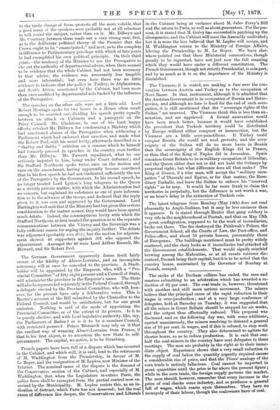The strike of the Durham colliers has ended, the men
and masters submitting to an arbitration which has awarded a re- duction of 84 per cent. The coal trade is, however, threatened with another and still more serious movement. The miners believe that the principal came of the rapid reduction in their- wages is over-production; and at a very large conference of delegates, held at Barnsley on Tuesday, it was suggested that all the mines in Great Britain should be stopped for six weeks, and the output thus effectually reduced. This proposal was discussed, and on the following day was, with some additions, carried unanimously, the miners resolving to demand a general rise of 10 per cent, in wages, and if this is refused, to stop work throughout the country. They also determined to agitate for shorter hours, so as to reduce production. It is said that one- half the coal-miners in the country have sent delegates to these meetings. The men are probably in the right as to their imme- diate object. Experience shows that a very small reduction in the supply of coal below the quantity urgently required causes, a considerable rise of price, and that the Times' analogy of the corn trade is entirely fallacious. Coal cannot be imported in great quantities until the price is far above the present figure ; -while in the corn trade, the foreign supply governs the market. The men should, however, remember that every increase in the price of coal checks some industry, and so produces a general fall of wages, which reacts upon themselves. They have no monopoly of their labour, though the coalowners have of coal.


































 Previous page
Previous page